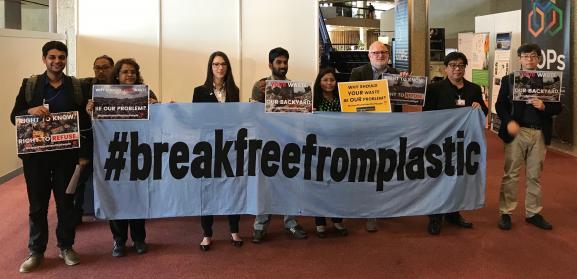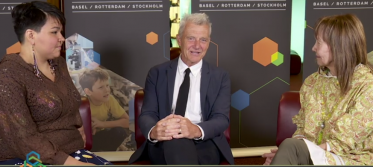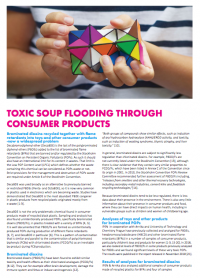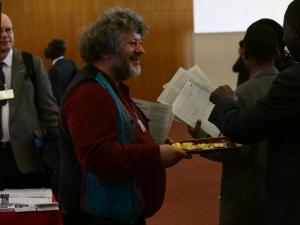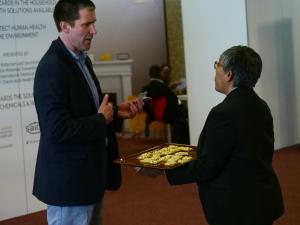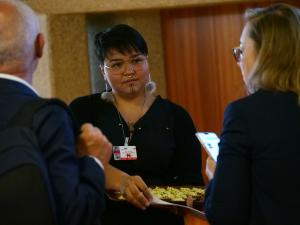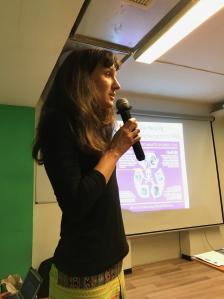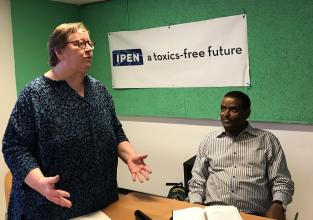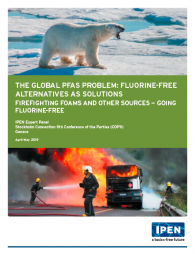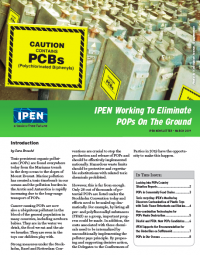10 May
IPEN Press release: UN meeting gives countries the right to refuse unrecyclable, polluting plastics
Governments at the 14th Conference of the Parties (COP14) of the Basel Convention acted to restrict rampant plastic waste exports by requiring countries to obtain prior informed consent before exporting contaminated or mixed plastic waste. A deluge of plastic waste exports from developed countries has polluted developing countries in Southeast Asia after China closed the door to waste imports in 2018. IPEN, the global network of environmental health, science and public interest organizations that has exposed environmental impcts of plastic waste exports to developing countries, applauded the move as a critical step to stem the toxic tide of plastic waste.
"This historic decision stops plastic trash dumping at the borders of exporting countries," said Dr. Mariann Lloyd-Smith, IPEN Senior Advisor.
Read the entire press release here
7 May
Justice for Asbestos Victims
On the opening day of the Rotterdam Convention COP, Indonesian and other Ban Asbestos campaigners, Rotterdam Convention Alliance representatives, and supporters held a vigil and media conference at the entrance to the meeting venue in order to remind delegates about their responsibility to include chrysotile asbestos in the Convention. Subono, a victim of asbestos, later gave the following intervention in the plenary:
"My name is Subono. I worked for 14 years at SICP, a manufacturer of chrysotile raw materials imported from Russia, Brazil and Kazakhstan. I am suffering from asbestos related disease from exposure to chrysotile asbestos. I am here representing other friends who are victims of asbestos in Indonesia and in the world.
We are angry with the countries blocking the listing at this Convention. There are over 200,000 deaths from chrysotile exposure every year. Millions dead over the last 20 years. Almost half of all global occupational diseases are caused by chrysotile asbestos but still no action here on this substance. COP9 marks the 7th COP over 12 years that chrysotile asbestos has been recommended but blocked.
We condemn this veto.
We know the lie of safe use. I worked in inhuman, dusty working conditions without real Personal Protective Equipment (PPE). This made me and my friends often experience pain, coughing, shortness of breath, fatigue. Examinations that companies did were company secrets and not accessible
We demand, at this meeting, chrysotile can be included in the list of Appendix III or that the Convention is reformed to ensure this. Our hope is that all delegates here support it.
How can the financial interests of just a few Parties block the desires of the many to protect workers like me, from toxic exposures?"
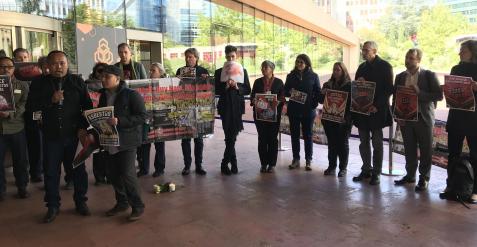
Break Free from Plastic
Basel Action Network, Break Free from Plastic, GAIA, IPEN and other partners greeted delegates as they arrived at the conference center with signs encouraging them to "Support the Norwegian Amendment" and "Break Free From Plastic."
Norway proposed amendments to the annexes to the Basel Convention to bring problematic plastic waste streams within the scope and control of the Convention. EIA, CIEL, IPEN and BAN prepared a short legal explanation of what the proposal would entail. Find the explanation here.
2 May
Indigenous representatives Vi Waghiyi and Siqiniq Maupin talk about POPs in this video
Information Fair Opens
The Information Fair opened, with the aim to "promote and facilitate the exchange of information for the implementation of the Conventions by providing an opportunity for partner institutions, non-governmental organizations, intergovernmental organizations and private companies to exhibit their information products, projects and technologies that are available to support the implementation of the Conventions, and to showcase and debate about the crucial role that information plays in achieving the objectives of the three Conventions."
IPEN brought an X-Ray Fluorescence (XRF) machine to Geneva to showcase how it can be used to determine the elemental composition of materials. Specifically, IPEN wanted to show visitors to the booth that some children's toys and other consumer products made of black plastic contain brominated flame retardants. With the use of the XRF device, we could demonstrate a fast technique for total bromine detection that indicates BFR/PBDE content in the recycled children's products. This simple technique may be used by the recycling industry and during state boundary controls on imported waste to find out about potential chemical hazards.
At the booth we also explained more about IPEN studies related to Toxics in Recycled Plastics.
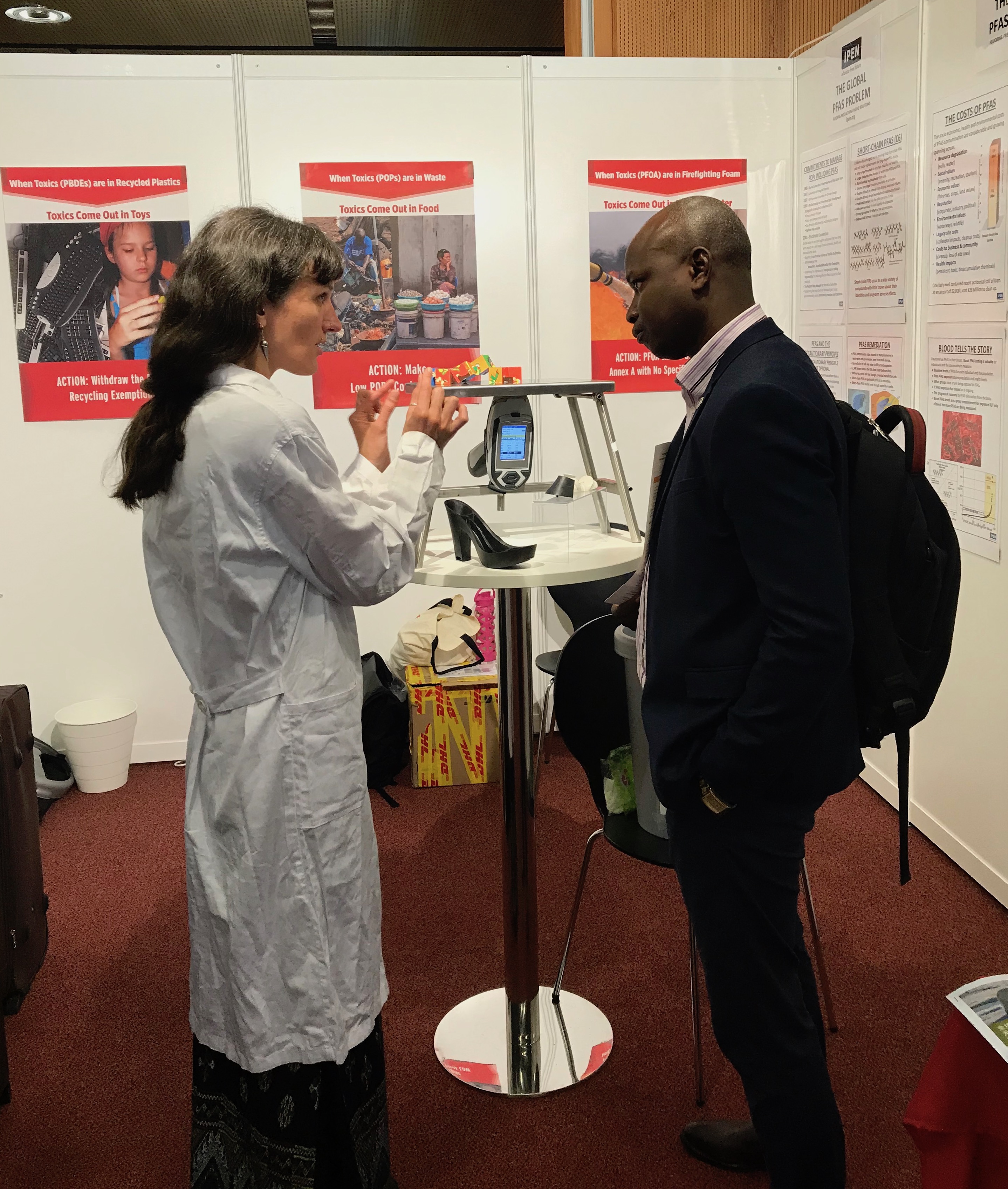
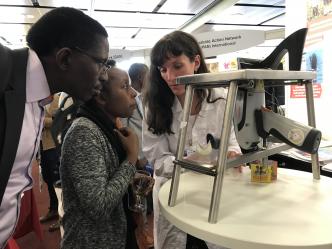
1 May
IPEN Side Event: The Global PFAS Problem: Fluorine-Free Alternatives as a Solution
IPEN convened an international panel of independent experts from the fields of fire safety, chemistry, health, product formulation, remediation, and policy to present information about problems with PFAS in firefighting foam and fluorine-free alternatives. The experts came from the oil and gas and aviation sectors to share their knowledge and expertise with BRS COP Delegates.
For more details about the agenda, please see the flyer here
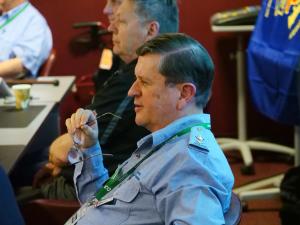
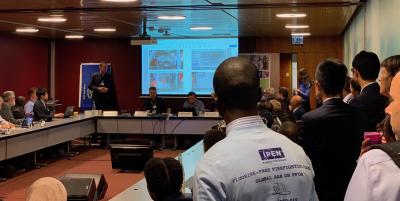
IPEN Press Conference
IPEN held a press conference in Geneva to promote a new press release: "Firefighters, oil and aviation industry representatives, and Indigenous Peoples call for a global ban on PFAS chemicals with no loopholes for toxic firefighting foams at UN meeting."
Industry fire-safety experts assert - and IPEN agrees - that no exemption is needed because cost-effective, fluorine-free alternatives work as well or better than PFOA- and other PFAS-containing foams. Unlike PFAS-containing foams, fluorine-free alternatives do not cause long-term harm to human health and the environment or incur the extremely high cleanup costs of PFAS-containing foams. PFOA never breaks down, it can cause cancer and it is found in the blood of Arctic Indigenous Peoples and wildlife.
Featured speakers at the press release were:
• Mr. Kim Olsen, Head, Copenhagen Airport Rescue and Firefighting Academy, Copenhagen Airport, Denmark
• Commander Michael Tisbury, Vice President of the United Firefighters Union, Metropolitan Fire Brigade, Melbourne, Australia
• Ms. Vi Waghiyi, Arctic Indigenous Expert (Yupik), St. Lawrence Island, Alaska USA
• Mr. Lars Ystanes, Environmental Specialist, Equinor, Bergen, Norway
Following the press conference, Reuters international news association printed the article, "China seeks loophole as UN nears pact banning toxic chemical- activists."
See a video of the press conference here.
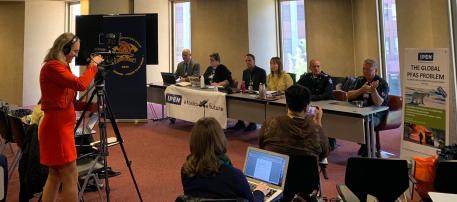
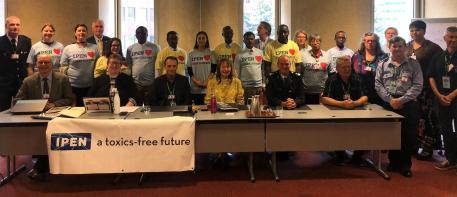
Press Release: High Levels of Dioxins Found in Children’s Toys and Other Products Made of Recycled Plastics Found in Argentina, Brazil, Cambodia, Canada, the EU, India, Japan and Nigeria
Brominated dioxins are highly hazardous chemicals that are known to affect brain development, damage the immune system and unborn children, increase the risk of cancer and risk disruption of thyroid function. They are formed unintentionally during production of brominated flame retardants. In addition, when plastics with brominated flame retardants are recycled and heated to re-form new plastic products, additional brominated and chlorinated dioxins are formed.
Dioxin and PBDE levels were found in all of the items sampled, and half of the products exceeded the proposed chlorinated dioxin hazardous waste limit. More than half of the analyzed products made of recycled plastic measured levels of PBDEs that meet current regulatory proposals of 1,000 ppm PBDEs, and these products that are within the weak regulation for PBDE contained 730 - 3,800 pg WHO-TEQ/gof brominated dioxins. Dioxins are extremely toxic in very small amounts. Levels of concern for dioxin substances are identified in the tenths of pictograms. The very high levels of dioxins measures signals that weak regulation of PBDEs can pose potential harms, not only from PBDEs, but also from PBDD/Fs.
Read the entire press release here
Read the report, Poisoning Our Goods: Toxics in Recycled Products, here
30 April
IPEN "Egg Action"
IPENers distributed crackers with eggs to delegates to highlight the extreme food chain contamination from highly toxic plastics in waste in Ghana that includes toxic e-waste shipped from Europe. IPEN and BAN researchers found the highest levels of brominated and chlorinated dioxins— some of the most hazardous chemicals on Earth— ever measured in free-range chicken eggs in Agbogbloshie, Ghana. The contamination results primarily from the breaking apart of discarded electronics (e-waste) and burning plastics to recover metals. Plastics from vehicle upholstery are also burned on the site and contribute to the contamination.
Eating just 2.5g of egg from a hen foraging in Agbogbloshie contains the equivalent of the daily intake of dioxins for 15 people.
Read the report here
See the flyer that was handed to delegates here
IPEN Views of Rotterdam COP9
In the run-up to the Rotterdam Convention's 9th Conference of the Parties (COP9), IPEN completed a "Views" document that addresses some issues that will be discussed at the COP9. These include enhancing effectiveness; compliance; amendments to Articles 16 & 22; listing HBCD, carbosulfan and chrysotile asbestos; and more.
The Views document can be read here.
More information about IPEN activities during the Rotterdam Convention can be found by clicking on the "Rotterdam COP9" tab at the top of this page.
29 April
Opening of the BRS COPs
IPENers greeted delegates on the first day of the the Basel-Rotterdam-Stockholm Conventions Conferences of the Parties (BRS COP) by wearing shirts that state, "IPEN Loves Firefighters / Fluorine-Free Firefighting Foam- Global Ban on PFOA" to show that we stand with firefighters (who suffer extraordinarily high rates of cancer) and everyone fighting for fluorine-free fIrefighting foam. IPEN aimed to remind the delegates that they are here to work towards stronger protection for firefighters, children, communities and the environment- and that the production and use of PFOA, PFOS and PFAS needs to stop.
More on the dangers of PFOA and sensible alternatives can be found in The Global PFAS Problem: Fluorine-Free Alternatives as Solutions.
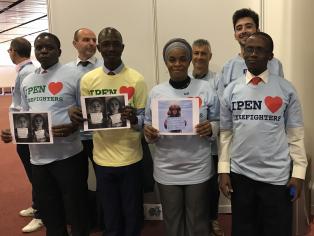
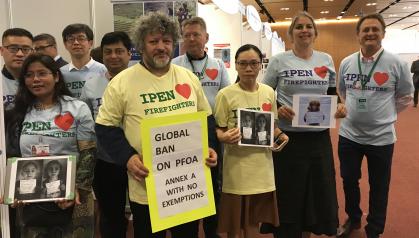
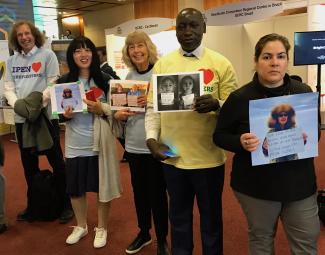
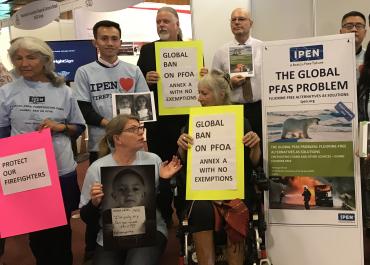
28 April
PFAS Pollution across the Middle East and Asia
Per- and polyfluoroalkyl substances (PFAS) have received significant public and media attention in the US, EU, and Australia, in part due to their toxicity, extreme persistence, and documented water pollution. However, information about PFAS in other parts of the world is largely lacking and the information which is available is difficult to access.
Over the past few months, IPEN Participating Organizations in twelve Middle Eastern and Asian countries conducted surveys to explore possible PFAS uses and pollution sources, scientific studies and government actions, including under the Stockholm Convention. Countries covered include: Bangladesh, Egypt, India, Indonesia, Japan, Jordan, Lebanon, Malaysia, Nepal, Sri Lanka, Thailand, and Vietnam.
The results of the surveys indicate the following:
- PFAS are poorly regulated in all countries examined
- PFAS contaminates adults and infants
- Water pollution with PFAS substances is widespread
- Marine and terrestrial organisms are contaminated with PFAS
- Firefighting foams and extinguishers containing PFAS are in use
- Consumer products are contaminated with PFAS
- PFAS substances contaminate dust and particulate air pollution
- US military bases in Japan cause PFAS pollution
- Japan is an important PFAS producer
27 April
IPEN Prep Meeting
IPEN Participating Organizations and partners met together in Geneva for a preparatory meeting about the Basel-Rotterdam-Stockholm Convention Conference of the Parties. Approximately 46 people from 24 countries attended the meeting, which addressed various subjects that will come up during the COPs such as PFOA, dicofol, marine litter, low POPs content, exemptions and more.
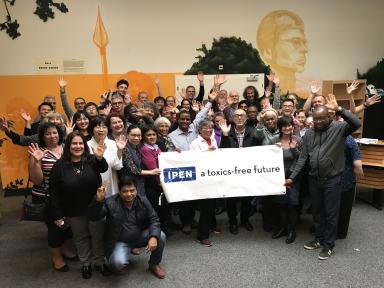
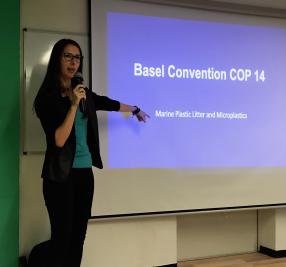
26 April
Make Low POPs Content Level Low Enough for Health and Environment Protection (English / 中文 / español / русский)
In this update about Low POPs Content Level written for the Stockholm Convention, information about the limits that IPEN supports for dioxins and furans, brominated POPs, and short-chain chlorinated paraffins is provided. Learn more in the brief found here.
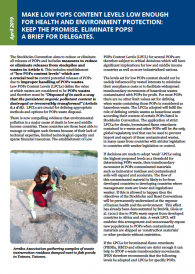
24 April
Press release: Fire-Safety Regulators, Scientists, & Industry Representatives Call for a Global Ban on PFAS Chemicals with No Loopholes for Toxic Fire Fighting Foams
New report includes new data on PFAS exposures to Australian Firefighters
(Göteborg, Sweden): Industry fire-safety experts from the oil and gas and aviation sectors are joining with firefighter trade unions to urge governments to protect human health and the environment with a global ban on the toxic chemical, PFOA, and to reject loopholes for its use in firefighting foams. The use of PFOA and other fluorinated organic compounds (PFAS) is widespread across many industrial and domestic applications including textiles, food packaging, stain and oil resistant treatments, and industrial processes. Fluorinated firefighting foam is a leading cause of water contamination with toxic chemicals that are associated with cancer, endocrine disruption, and harm to fetal development.
The upcoming 9th Conference of the Parties to the Stockholm Convention on Persistent Organic Pollutants is scheduled to address a global ban on PFOA as the UN meeting commences next week (April 29-May 10). A key issue will be whether an exemption should be granted for continued PFOA use in firefighting foams. Industry fire-safety experts assert that no exemption is needed because cost-effective fluorine-free alternatives work as well or better than PFOA- and other PFAS-containing foams. Unlike PFAS-containing foams, fluorine-free alternatives do not cause long-term harm to human health and the environment or incur the extremely high cleanup costs of PFAS-containing foams.
The Stockholm Convention's scientific expert body recommended global elimination of PFOA due to its toxicity, persistence, bioaccumulation in the food chain, and ability to travel long distances. They also recommended strengthening the listing of PFOS in the treaty by closing a large number of loopholes. Since PFOA and PFOS have been used in firefighting foams, the expert body addressed alternatives to them, warning against using the entire class of PFAS substances in firefighting foams, "due to their persistence and mobility, as well as their potential negative environmental, human health and socioeconomic impacts." (POPRC-14/2)
In their new report, the fire safety experts demonstrate that PFAS alternatives to PFOA and PFOS are similarly toxic and even harder to control, leading to increased pollution, exposure, and presence in the food chain. In contrast, world-class airports and major companies have thrown their weight behind fluorine-free firefighting foams.
Read the entire press release here
Read Executive Summaries (عربى/ English / français / 中文 / español / русский) and the full report, The Global PFAS Problem: Fluorine-Free Alternatives as Solutions, here
23 April
Press Release: Highest Level of World’s Most Toxic Chemicals Found in African Free-Range Eggs: European E-Waste Dumping a Contributor
(Göteborg, Sweden): New research from IPEN and Basel Action Network (BAN) reveals dire human exposures and food chain contamination from highly toxic plastics in waste in Ghana that includes toxic e-waste shipped from Europe. Researchers have found the highest levels of brominated and chlorinated dioxins— some of the most hazardous chemicals on Earth— ever measured in free-range chicken eggs in Agbogbloshie, Ghana. The contamination results primarily from the breaking apart of discarded electronics (e-waste) and burning plastics to recover metals. Plastics from vehicle upholstery are also burned on the site and contribute to the contamination.
Researchers analyzed the eggs of free-range chickens that forage in the Agbogbloshie slum, home to an estimated 80,000 people who subsist primarily by retrieving and selling copper cable and other metals from e-waste. The process of smashing and burning the plastic casing and cables, to extract the metals, releases dangerous chemicals found within the plastics, such as brominated flame retardants, and creates highly toxic by-product chemicals like brominated and chlorinated dioxins and furans. The sampling of eggs revealed alarmingly high levels of some of the most hazardous and banned chemicals in the world, including dioxins, brominated dioxins, PCBs, PBDE and SCCPs.
Read the entire press release here
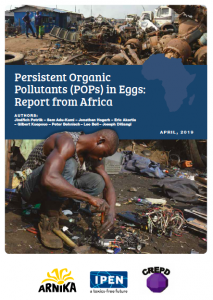
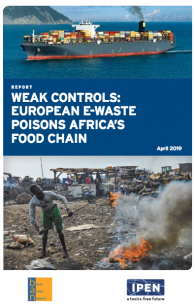
BAN and IPEN Quick Views of Basel Convention COP14 (中文 / English / русский / لعربية)
In the run-up to the Basel Convention's 14th Conference of the Parties (COP14), IPEN worked with Basel Action Network (BAN) to complete a "Quick Views" document that addresses some issues that will be discussed at tthe COP14. These include marine litter and microplastics; financial resources; compliance; e-waste guidelines; POPs waste; technical guidelines on incineration, engineered landfill, hazardous waste physico-chemical treatment and biological treatment; and more.
22 April
IPEN Working to Eliminate POPs on the Ground (عربى/ English / français / 中文 / español / русский)
As the 2019 Basel-Rotterdam-Stockholm Conventions Conferences of the Parties (BRS COPs) approaches, IPEN has dedicated the first of its 2019 bi-annual global newsletters to cover persistent organic pollutants (POPs).
In the newsletter, entitled "IPEN Working To Eliminate POPs On The Ground," IPEN Science Advisor Dr. Sara Brosché states, "Strong measures under the Stockholm, Basel and Rotterdam Conventions are crucial to stop the production and release of POPs and should be effectively implemented nationally. Hazardous waste limits should be protective and regrettable substitutions with related toxic chemicals prohibited.However, this is far from enough. Only 28 out of thousands of potential POPs are listed under the Stockholm Convention today and efforts need to be scaled up dramatically.”
This newsletter covers some work of IPEN Participating Organizations around the globe who have researched and/or monitored POPs in their countries. Topics include POPs Country Situation Reports, POPs in Community Food Chains, Toxic Recycling, Non-combustion Technologies for POPs Waste Destruction, Dicofol and PFOA, Sulfluramid, and POPs in Our Oceans.
The newsletter is available online in Arabic, Chinese, English, French, Russian, and Spanish here.
18 April
IPEN's Views of Stockholm Convention COP9 (English / 中文 / español / لعربي / русский / français)
IPEN has released its "Views of Stockholm Convention COP9." This document is a summary statement of IPEN views on issues that COP9 will be called upon to address, including POPs wastes, tecnical assistance and regional centres, rules of procedure, compliance, listing of dicofol and PFOA, illegal traffic, rules of procedure, evaluation of PFOS, and more.
The Views document can be read here.
17 April
Legal Opinion Finds Canada In Violation of Basel Convention
A recent legal opinion from the Pacific Centre for Environmental Law and Litigation Law Corporation has determined Canada’s refusal to repatriate 103 shipping containers of garbage illegally dumped in the Philippines in 2013 and 2014 to be in violation of the Basel Convention.
Read the letter and legal opinion that has been sent by IPEN and partner NGOs Right On Canada, Canadian Environmental Law Association, EcoWaste Coalition, and Basel Action Network to Canada’s Prime Minister Trudeau about this issue, which is not just a legal matter, but also a moral issue that demonstrates Canada’s level of respect for the citizens of developing countries and how the nation demonstrates proper conduct. Leaving Canada’s garbage in another country for five years reveals values that clash with moral responsibility.
16 April
NGOs Urge Immediate Action to Stop Toxic Recycling
A recent analysis (by IPEN, Arnika and other NGOs) of consumer products sold in Brazil, Canada, Cambodia, EU and Japan made from recycled plastics has revealed toxic flame-retardant contamination in some children's toys, hair accessories, office supplies, kitchen utensils and other plastic products. Brazil, Canada, the European Union, Japan, the Republic of Korea and Turkey are 7 out of 182 Parties to the Stockholm Convention that registered a recycling exemption for toxic polybrominated diphenyl ethers (PBDEs), which are persistent organic pollutants (POPs), after they were banned under the Stockholm Convention in 2004. The exemption has permitted recycling of materials such as plastics from discarded computers and other products containing PBDEs in the recycling stream for the past ten years, and will allow it to continue until 2030. Via letters, environmental health organizations are urging the seven governments to end the practice and withdraw the recycloing exemptions because the resulting contamination of the recycling stream allows banned chemicals in products and poses a threat to public health, particularly children's health.
See the letters here to Brazil, Canada and the Republic of Korea here.
15 April
IPEN Guide to New POPs and the PFOS Evaluation (عربى/ English / français / 中文 / español / русский)
For consideration at the Stockholm Convention's COP9, the Treaty’s expert committee, the POPs Review Committee (POPRC), has recommended two substances for listing: dicofol and perfluorooctanoic acid (PFOA), its salts, and PFOA-related compounds. The POPRC has also recommended strengthening the listing of PFOS in the treaty. Finally, one Party has proposed changing the process for evaluating candidate substances.
In this new Guide, IPEN provides recommendations about listing dicofol and PFOA, and perspectives on the suggestion for amending the evaluation process and the PFOS evaluation. The Guide also provides information about the serious hazards related to the use of dicofol, PFOA and related substances, and PFOS. Read the Guide here
Please go here for more information about the proposal to amend the Stockholm Convention evaluation process for candidate substances.
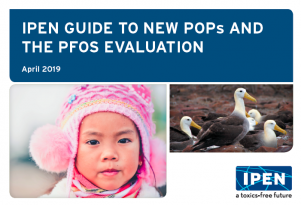
12 April
Say No to Sulfluramid: Reasons for a Worldwide Ban on this Toxic Agrochemical (español, English, português)
Sulfluramid is a chemically-synthesized pesticide used as a formicide, which, as it breaks down, turns into perfluorooctane sulfonate (PFOS). PFOS is a toxic, extremely persistent and bioaccumulative pollutant, subject to worldwide restrictions pursuant to the Stockholm Convention on POPs. This Convention, intended to protect human health and the environment, took effect in 2004, and has been signed by most governments, includiing in Latin America and the Caribbean, where sulfluramid is widely used. At the upcoming Stockholm Convention COP9, IPEN believes that sulfluramid needs to be explicitly mentioned in Annex B on PFOS, and "acceptable uses" needs to be changed to "specific exemptions" for controlling leaf-cutting ants of the Attaand Acromyrmex genera. Learn more in this factsheet about sulfluramid.

11 April
Briefing Paper on Non-combustion Techniques for POPs Waste Destruction (中文 / English / عربى )
Non-combustion techniques for the destruction of persistent organic pollutants (POPs) waste such as PCBs, dioxins and brominated flame retardants are urgently needed to destroy the world's growing stockpile of materials contaminated with the most dangerous contaminants on earth. Using incineration and cement kilns to attempt to destroy POPs only leads to the generation of more unintentionally produced POPs (UPOPs) in their emissions and solid waste. This new technical briefing paper from IPEN describes non-combustion techniques that have been commercialised and proven for the destruction of POPs. They are also considered to be more readily applicable to developing countries due to their less intensive capital and infrastructure requirements.
Non-combustion techniques for POPs destruction have never been more relevant as new POPs are added to the Stockholm Convention and new stockpiles of waste must be addressed.
View the new paper here
10 April
IPENers will be participating in the Meetings of the Conferences of the Parties (COP) to the Basel, Rotterdam and Stockholm Conventions taking place from 29 April - 10 May, 2019 in Geneva, Switzerland. Although the Stockholm Convention COP is IPEN’s main focus, IPEN will also participate in the Basel and Rotterdam Convention meetings. Please check back shortly for more information about IPEN's publications and actvities related to the meetings.

